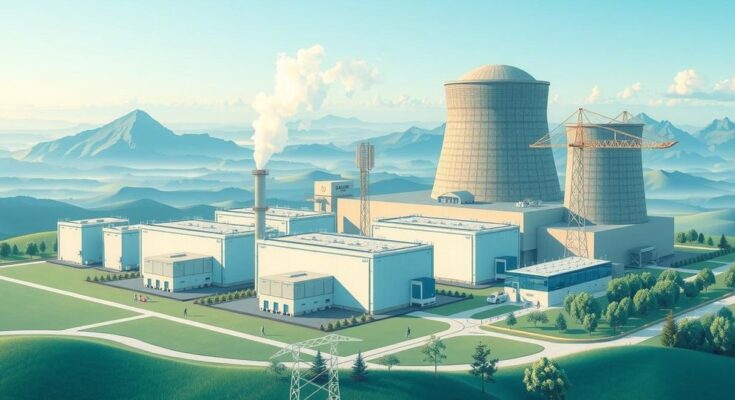Ghana has selected the U.S. and China as vendors for its first nuclear power plants. NuScale Power and Regnum Technology Group will build Small Modular Reactors (SMRs), while China National Nuclear Corporation will construct a Large Reactor (LR). This initiative aims to enhance energy security and advance industrialization, with a plan to integrate one gigawatt of nuclear energy into the national grid by 2034.
Ghana has chosen the United States and China as the prospective vendors for its inaugural nuclear power plants, despite having not finalized any contracts. The U.S.-based NuScale Power, working alongside Japanese partners, is set to construct Small Modular Reactors (SMRs). Concurrently, the China National Nuclear Corporation will develop a Large Reactor (LR). This announcement was made by Dr. Stephen Yamoah, Executive Director of Nuclear Power Ghana, during a media interaction in Accra.
The Large Reactor is projected to have a capacity of 1,200 megawatts, while the SMRs will collectively generate 924 megawatts, distributed over 12 modules, each yielding 77 megawatts. According to Dr. Yamoah, the LR will operate under a Build, Operate, and Transfer (BOT) model with local equity involvement, whereas the financing for the SMRs will rely on Public-Private Partnerships (PPP). Ghana has signed a framework agreement with the selected vendors, and experts are currently conducting environmental studies for potential sites.
Mr. Archibold Buah-Kwofi, Acting Director of the Nuclear Power Institute, emphasized the necessity for stable and affordable electricity to foster national development. He noted that Ghana’s current energy mix is heavily dependent on fossil fuels and hydroelectricity, with renewables contributing a mere one percent. He stated, “We need to fast-track the adoption of nuclear power to secure our energy future,” highlighting the critical need for strong regulatory systems and a skilled workforce.
The introduction of nuclear power aims to decrease reliance on fossil fuels, combat climate change, and improve energy security. The government’s objective is to incorporate one gigawatt of nuclear energy into the national grid by 2034, facilitating industrialization, offsetting dwindling hydroelectric sources, lowering tariffs for businesses, enabling desalination, and generating employment opportunities.
The selection of vendors followed a meticulous process after receiving 16 responses to the government’s procurement notice. A specialized team, overseen by the Energy Ministry, initially shortlisted five vendors before arriving at the final two selections. Ghana’s pursuit of nuclear energy, which was interrupted by a coup in the 1960s, gained momentum again in 2006 with support from the International Atomic Energy Agency (IAEA). This initiative aligns with the efforts of several African nations aiming to harness nuclear energy as a solution to power shortages and to stimulate economic growth.
Ghana’s decision to select the United States and China for constructing its first nuclear power plants marks a pivotal step toward energy diversification and security. The planned integration of nuclear power facilitates a more stable and affordable electricity supply, essential for the nation’s development. Achieving this goal will not only reduce Ghana’s dependence on fossil fuels but also support industrial growth, job creation, and sustainable practices, all vital for its economic future.
Original Source: www.myjoyonline.com




